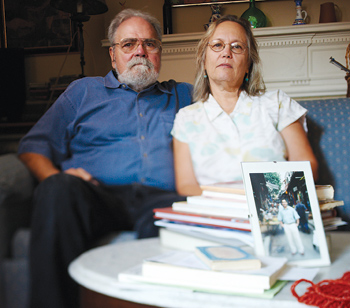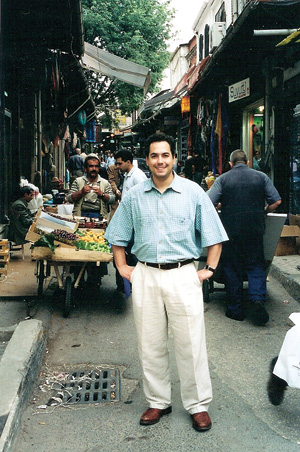In the Name of the Son

Photo by Ryan Brenizer
Ten years ago, Orlando Rodriguez, Ph.D., was teaching at Fordham on the day his 31-year-old son, Gregory, an assistant vice president at Cantor Fitzgerald, died in the 9/11 attack on the World Trade Center.
Through the awful, lasting grief of losing a child, through searing emotions and sobering realizations, Rodriguez and his wife, Phyllis, transformed their pain into a restorative brand of justice that would bring meaning and dignity to their son’s sacrifice.
Rodriguez’ journey from anger and grief to forgiveness, acceptance and hope, he said, comes from “right out of the Gospels.”
“I can’t tell you that on September 11, 2001, I consulted the Gospels and thought, ‘This is how to act,’” he recalled. “But now, 10 years later, I can see that my journey took me in the direction of peacemaking. It sounds trite—turn the other cheek, judge not lest you be judged, examine yourself—but these kinds of honest examinations were the kinds of emotions that went into what we decided to do.”
In the days after the attacks, the couple wrote a letter titled “Not In Our Son’s Name,” which called on the United States government to reject military reprisals against the Afghan people. Its popularity on the Internet led Rodriguez and his wife to meet like-minded people who also lost family members in the attacks. Together they founded the group September 11 Families for Peaceful Tomorrows.
Then, in November 2002, they and some others were invited to meet the mother of Zacarias Moussaoui, the so-called “21st hijacker,” who faced the death penalty for helping to plan the 9/11 attacks.
At Moussaoui’s sentencing trial, Rodriguez gave a victim impact statement on behalf of the defense, describing, among other things, the course he co-taught in the spring of 2002 on terrorism and society. The defense’s intention—successful, as it turned out—was to show jurors that many families of 9/11 victims were able to turn their grief into productive action.
Ultimately, Moussaoui was spared the death penalty and sentenced to life in prison.
It was a huge emotional challenge to testify, said the professor of sociology and criminology, but he had come to view his son as one of many victims of unjust wars and incursions waged in a “mad century of mutual violence.”
“Nearly 3,000 of our people, including Greg, were killed in that first incursion, and then many more than 3,000 Afghan and Iraqi civilians were killed next, and since then it has only climbed,” Rodriguez said. “Is my son’s death more meaningful than the death of some poor Iraqi boy who happened to be in the wrong place when a bomb fell? Or that of one of our soldiers killed by a roadside bomb?
“Honestly, I can’t say that it is. I have learned to equate their suffering with losing Greg.”
The couple’s story is being captured in the documentary film In Our Son’s Name. Produced and directed by Gayla Jamison and funded by the Catholic Communication Campaign and Al Jazeera English, it details the couple’s decision to befriend Moussaoui’s mother and to testify in the sentencing trial.
“We didn’t want to do the movie at first,” Rodriguez said. “We knew it was going to heighten the feelings we had experienced, just make them more raw.
“But we also knew there was potential here for opening people up, especially Americans, to the fact that there is such a thing as reconciliation and restorative justice.”
Once the film is complete, Rodriguez said he would like to show it at Fordham because it offers what he calls a teachable opportunity for students who were children when the attacks happened; and he is a teacher, after all.

Photo courtesy of Orlando and Phyllis Rodriguez
“Ten years ago, the media showed us a lot of images of Arabs dancing in the streets after the towers fell,” Rodriguez recalled. “When Bin Laden was killed, I was taken aback by the fact that people who were 9 or 10 years old on 9/11 were cheering, celebrating—almost treating it like a sports event in which the United States had won. How is that different from Arabs dancing in the streets?
“I believe that there are a lot of misconceptions about political violence and terrorism, and that the message in this film can show students that there is another way of thinking about 9/11 and its aftermath.”
Rodriguez spent the 10th anniversary of his son’s death participating in a Fordham memorial event at Rose Hill, and he and his family also had a private gathering at his son’s gravesite. It was a day, he said, that was guaranteed to open wounds, but it was also a day to create opportunities to offer comfort to others.
“A lot of things have happened since 9/11,” he said. “But in some ways, it just happened yesterday.”
